
 |
On their return to Kensington, the Investigators discovered a report waiting for them, regarding the explosives residue Holmes had taken from Cavendish's rifled safe. As he'd suspected it was very specialized - in fact, unique - made in only one place in the world. A product of the Nobel chemicals plant outside Paris, it was still experimental and not yet commercially available.
Cavendish was already primed with a new mission for them. "I want you to go to Liverpool and see a madman," he said. Churchill kept to himself a suspicion that they were already seeing a madman. Cavendish handed over a sheet of paper. "One of our researchers found this last week," he said, "it seems to chime with what we've discovered so far."
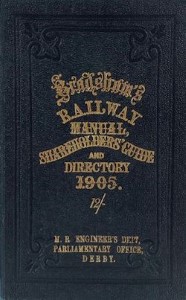 |
The document was headed "The Mrs Grace L Fergusson Hospital for the Irredeemably Insane" and described the admission of one Captain Jack Anson. On the 26th of August, the trawler Cilla blundered into Liverpool harbour, listing badly and showing all the signs of serious storm damage - despite there being good weather for the previous week. Most of the crew were missing, except for two who were dead on the deck from various wounds. Captain Anson himself was at the helm and had somehow brought the ship back despite being raving insane, suffering delusions about hammers and fire falling from the sky. He was quickly sectioned and delivered to the GLF Hospital, where the notes recommended electroshock and experimemtal drug therapy with no particular air of hope to achieve anything.
Holmes pulled out Bradshaw. "Looks like we're going up north again," he said with a chuckle. Cavendish nodded in satisfaction. "I'll wire ahead and arrange things," he said.
Arriving at Lime Street station, the investigators, Smith and Pte Blakeney emerged and engaged a four-wheeler and gave the address. A quarter of an hour later, they disembarked outside the asylum.
 |
Enclosed in iron railings and surrounded by overgrown grounds, the place was not at all theraputic in appearance. Exchanging glances, the investigators approached the door and rang the bell. After a long pause, the door creaked open and a bland-looking man in an attendant's jacket peered out. "Yes, gentlemen, may I help you?" he asked. They explained that they were here to visit one of the patients on government business. "Please follow me," the man said in a neutral tone and led them into the building.
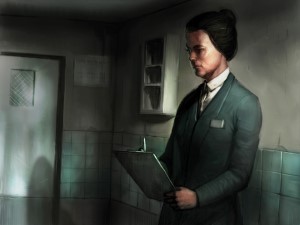 |
The interior was all dark panelling in a spartan but organized style, with small offices and filing-rooms off to the side, as well as examining rooms. At the end of the corridor was a larger door with "Mdm Gestalt - Governor" inscribed on it. The man knocked, and ushered them inside.
Lined with books, the office was significantly larger than the others, and occupied by a single woman. Dressed in severe grey and with her hair gathered into a tight bun, her face was all angles and planes, with little in the way of sympathy or empathy showing. At first she was deeply suspicious of the visitors from London - not least, it seemed, because they were from London, and also because they had a soldier with them - but once Churchill had explained that this was all on behalf of the Government, she became co-operative and summoned a trim, pretty nurse to show them to Captain Anson's room. Holmes paused, and asked if he could see the Captain's file. Madam Gestalt summoned Broyce, the man who'd guided them before, and sent him in search of the file. Holmes elected to wait, and Churchill, Quartermain, Smith and Blakeney followed Nurse Halligan into the asylum proper in search of Captain Anson.
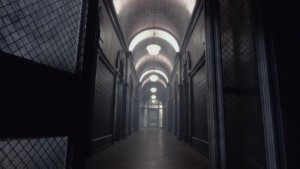 |
The nurse led them through several extremely strong secure doors into a maze of corridors, clearly once tiled in institutional green, but now rather dingy and dank, poorly-lit and smelling of disinfectant and unwashed bodies, shot through with screams, moans and insane laughter. Halting before a door, she produced a heavy bunch of keys and unlocked it, before pushing it open and pointing inside. Her expression made is clear that she thought they were wasting their time on a simple lunatic.
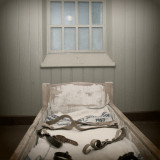 |
The room was small, and almost unfurnished except for sanitary necessities and a heavy bed. Fastened to this by restraints was man in his fifties with a weatherbeaten face and white hair. As they entered, he had been muttering to himself, but as he caught sight of them he began to shout and scream, heaving and struggling in his bonds.
"Listen to me! I have to warn you! Fire from Heaven!” he screamed. “The Hammer of God has fallen, and the tentacles of the Dark Powers are coming for us. Souls! They want our souls! Flee, O Man, and hide yourself in the Uttermost Depths lest they find you….” He broke off, weeping. "You don't believe me, either. I can see it in your eyes. You're no different. You don't believe me..."
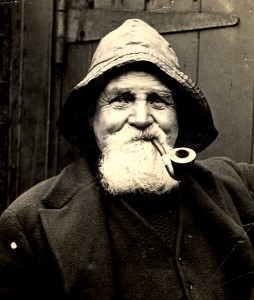 |
Quartermain and Churchill glanced at each other. Clearly the key here was going to be convincing this poor shattered wreck of a man that they did believe him. Approaching the bed, they spoke kindly to him, reassuring him that they did believe him and wanted to know more. "Tell us what really happened," asked Quartermain gently. Hunter he might be, but the sight of any living creature caged was not comfortable to Quartermain of the wide plains of Africa.
“It was a Friday, I remember that, because I had to pay the crew. Friday during all that stuff with Mars.” This comes out as either the 18th or 25th August, 1904. “We was out west, south of Man. Fish was running good, weather was clear. It was a good day to be out.“ He became more agitated and upset. “Then it fell from the sky; just fell from the damned sky! The Hammer of God! Green flame from Heaven, thrown on us sinners. God’s ocean rose against us – on a clear still day! No, no; I can tell, you don’t believe me….” He began to weep and struggle again.
Smith stepped forward and explained gently what he had seen, in the war; for he had seen two cylinders fall, from different perspectives. As he was speaking, Holmes joined them, and he added his skill at dealing with people to the effort. Anson relaxed again, and a few minutes later resumed his story.
“The wave struck us a few seconds later, a wall of water; we’d no warning to batten down the hatches or secure anything. Most of me crew was washed overboard, poor souls, gone down to their deaths. Only Jonas was left, and he’d got it into his head that it was something I’d done; attacked me with a gutting-knife. I had to hit him hard, and I think I killed him. I’m sorry for that, he was a good First Mate. I thought she were going to sink after that, but I managed to keep the old girl afloat until I got her home – somehow, I don’t know how. That’s what happened, sirs, as God is my witness! You have to believe me. You have to! God’s wrath has come for us all!”
Stepping outside, the investigators conferred. Anson was clearly an important witness, but equally clearly he was simply left to rot here. Holmes obtained a telegram form from the office, and they worked out a sufficiently obscure message to Cavendish, requesting that Anson be transferred to somewhere a little more like a hospital nearer to Kensington. Blakeney was despatched to the telegraph office to get the telegram sent, while Quarterman and Churchill headed down to the harbour. "We need the Cilla's log," said Holmes, "it may be able to pinpoint where the cylinder came down." Quartermain snapped his fingers. "South of Man," he said, quoting Anson, "Isle of Man?" Churchill grinned. "It's a start," he said. Holmes and Smith stayed to go over Anson's file in more detail, and to continue trying to soothe and understand the crazed Captain. After some time, Anson began to show some signs of improvement, though he remained obviously terrified of the sea; once his livelihood, now his darkest nightmare.
Churchill and Quartermain hailed a two-wheeler and were soon walking into the gates of Liverpool docks. A century hence, Liverpool's docks would be desolate and abandoned, but at the turn of the 20th Century they were bustling, alive, a hub and nexus of trade and shipping for the north of England. A hundred accents and nationalities swirled around the two investigators as they walked through the harbour. A few questions located the harbourmaster's office. Blakeney had caught them up, not wanting to be left in the Asylum any longer.
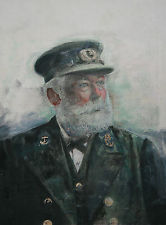 |
The harbourmaster, Albert Russell, appeared close to panic at the sudden appearance in his office of two gentlemen accompanied by a British Soldier; "Is there another war on?" he gasped. Churchill rushed to reassure him, and with some difficulty overcame his reluctance to let strangers on board a man's boat when he wasn't there to agree.
"Davies!" he yelled in a voice which could have been heard quite clearly across the harbour. A young docker put his head through the door. "Take these gents to the Cilla and let 'em on board," Russell continued. Gesturing over his shoulder, Davies led the way out of the office and across the harbour to where a battered, derelict-looking trawler was moored to the quay. Running a gang-plank out to the vessel, Davies stepped back and indicated it with a smile. It was quite obvious that he had no intention of boarding with them, so Churchill and Quartermain shrugged and headed across to board the boat.
As they stepped aboard, the reason became apparent. All fishing harbours smell a little fishy; but the Cilla reeked beyond anything either man had ever encounterd. With a sinking sensation, they realized that the trawler's catch had not been emptied since its' arrival ... six months ago. Gulping, Quartermain steeled himself, and headed for the hatches to the hold. Churchill headed for the superstructure where the wheelhouse and captain's cabin were going to be.
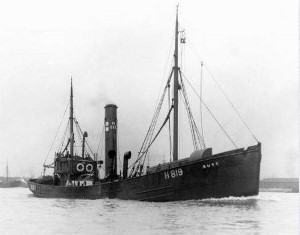 |
Carefully, Quartermain climbed down the ladder leading into the hold. The stench of rotten fish increased with every step, and the slight movement of the ship sent unsettling flickers of light back and forth across the hold. Slightly more than halfway down, an abrupt crack below was the only warning he had before the rung he was standing on broke and he began to plunge into the hold. Desperately, he grabbed out and by a stroke of luck, caught one of the side rails of the ladder. For a horrible moment, he swung by one hand over the horrendous, slightly phosphorescent mass below. Then he got a foot hold and pulled himself to safety.
Racked nearby were several rakes, apparently for shifting the fish into even piles in the hold, and he used one of these to poke around among the noisome rotten fish. Nothing else became apparent, but something still seemed wrong, and he pondered, considering what it might be. Then it came to him. There were no rats. No cats, either. No gulls. No maggots. Nothing had come to feast on this unguarded bounty of decaying meat.
Churchill had climbed into the captain's cabin, set above the deck at the stern of the ship. A movable partition existed to divide it from the chart-room, but this was pushed back. Like Quartermain, the eerie atmosphere was beginning to get to him, and he had his pistol in his hand as he glanced around. Seeing no immediate danger, he pocketed the weapon and started searching.
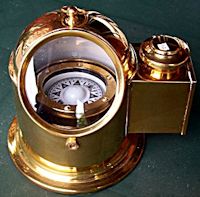 |
The cabin had once been neat, tidy and well-organized, if very worn and cheaply fitted. At some point, however, it had been violently disturbed and disarranged. Two of the windows at the port side were smashed. The compass in its' binnacle under the front windows was smashed, apparently by a bullet which had angled down from the starboard-aft, within the Captain's cabin. A bloody smear marked the floor nearby, which the soldier in Churchill recognized as sufficient for a mortal wound. Somebody had died by violence here. Carefully, he searched floor, and came up with four empty .38 cartridge cases - the most common revolver load.
 DM Note: A very good roll by Lizzie - and a very cheap safe! DM Note: A very good roll by Lizzie - and a very cheap safe! |
At the back of the cabin was a small, cheap safe. Churchill knelt down to look at it. He knew his ability with locks was nearly no-existent, but he'd watched Billy the Wrist work, and had some idea how to proceed. With two bits of wire salvaged from the smashed binnacle, he probed inside the lock, twisting and pushing, and much to his own surprise, the lock clicked and the safe came open.
Inside he found a shabby cardboard box with "Webley" printed on it. Inside were several rounds of .38 ammunition and a space where a revolver had once sat. There was also a sturdy leather wallet containing the ship's papers, a petty-cash box with £9/11/6 in cash, and the ship's log book. He flipped through the pages, but the cramped notation made no sense to him and he pocketed it and the papers. The rest he locked back in the safe.
The chart-room was even more of a mess, with sheets of heavy paper all over the floor where they'd come off the table, some beginning to rot where they'd been soaked through the broken windows. Churchill eyed this for a moment; then his attention was caught by the sound of approaching footsteps. Drawing his pistol, he shrank against the wall - then relaxed as Quartermain entered, himself looking more than a little nervous. The atmosphere on the doomed ship was getting to them both. Together, they returned to the charts, and Quartermain soon located the last chart to be used, with the plot-line of the Cilla's last trip ending abruptly in the Irish Sea ... just south of the Isle of Man.
"We need to get back to the Asylum," said Churchill. "I'm wondering if Captain Anson has had any other visitors."
As they prepared to disembark, something else caught the hunter's eye. The Cilla normally had two boats mounted for'ad of the hold. One was missing - not surprising if the ship had been washed over by the wave of a falling cylinder. But where the lashings had been to hold it down, an axe was stuck in the deck with a loose end of the rope dangling. Someone had cut the boat free...
Session Date: 21st May 2015 |